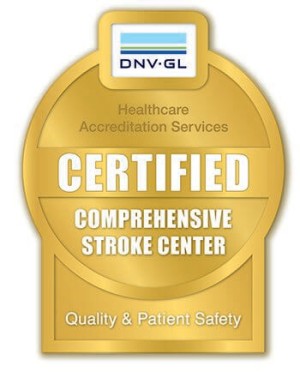Stroke Care
When symptoms begin, every second counts

Starting appropriate treatment immediately can help to prevent the devastating effects of this disease that is the third leading cause of death and the leading cause of adult disability in the United States.
Adventist Health Glendale’s specialized stroke team works together to individualize the care of each patient while following best practice guidelines which have been shown to improve the outcomes of patients who have a stroke.
Know the stroke warning signs
When a stroke strikes it is important to recognize what is happening and act rapidly. One easy to remember way is BE FAST.
B - Balance: Sudden loss of balance or coordination
E - Eyes: Sudden vision change/trouble seeing
F - Face: One side of the face droops when the person smiles
A - Arm: One arm drifts down when the person raises arms
S - Speech: Person's speech in slurred, slow or strange
T - Time to call 9-1-1
Could you be at risk for stroke? Take our quiz today
Stroke experts who go beyond the gold hour of care
At Adventist Health Glendale, we recognize that stroke is a serious threat to the health and well-being of our community and is one of the leading causes of death and disability in the U.S. That's why we've taken steps to ensure that Adventist Health Glendale provides stroke care that meets and exceeds national standards for the treatment of stroke patients and focuses on helping you recover and get back to your life.
As a result of this commitment to excellence, Adventist Health Glendale was the first hospital in California to receive certification as a Comprehensive Stroke Center by DNV GL Healthcare USA, Inc. By earning this prestigious accreditation, the hospital has demonstrated that our stroke program exceeds patient safety standards set by the U.S. Centers for Medicare & Medicaid Services, the Brain Attack Coalition and the American Stroke Association.
Our Services
The Adventist Health Glendale Stroke Program specializes in the diagnostic and therapeutic care of patients with problems in the blood vessels of the brain, including:
- Ischemic stroke - Results from an obstruction in a blood vessel supplying blood to the brain.
- Transient ischemic attack (TIA, or "mini-stroke") - A temporary blockage in a blood vessel supplying blood to the brain, usually lasting only a few minutes. A TIA can be a warning sign of stroke.
- Carotid stenosis - Narrowing of the carotid arteries, which supply blood to the brain, due to atherosclerosis, or build-up of fat, cholesterol and other substances in the blood stream.
- Cerebral hemorrhage - Bleeding inside the brain.
- Aneurysm/Subarachnoid hemorrhage - Weakening in the walls of a blood vessel, which can burst and cause bleeding in the brain.
- Vascular malformation of the brain - An abnormality in the veins or blood vessels of the brain.
Seeking immediate treatment—within 90 minutes—for stroke and symptoms like stroke significantly increases a patient's chances for recovery and survival.
If you think you or a loved one might be having a stroke, call 9-1-1 IMMEDIATELY. New medications and interventions can minimize damage to the brain if help is sought in time.